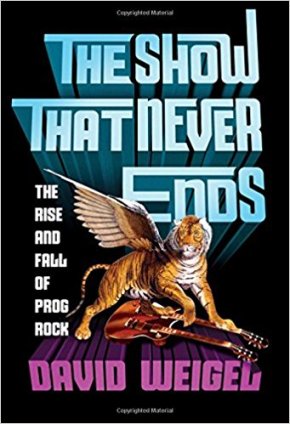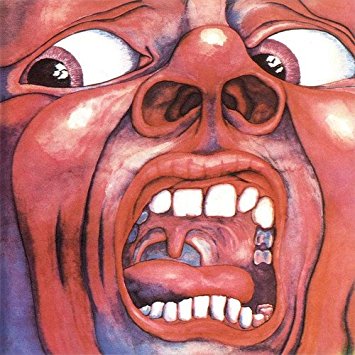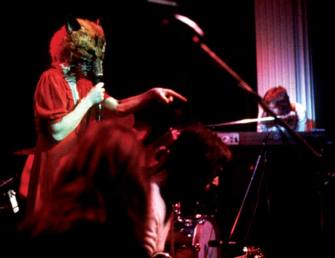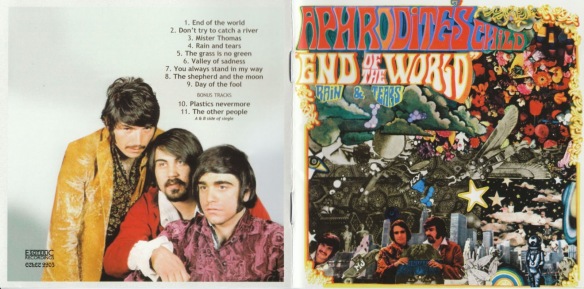 The Show That Never Ends: The Rise and Fall of Prog Rock by David Weigel, WW Norton & Co, 2016
The Show That Never Ends: The Rise and Fall of Prog Rock by David Weigel, WW Norton & Co, 2016
In the summer of 1954, Sam Phillips, the owner of Sun Records, had a dream. “I need an American kid who sounds German.” Luckily, a young truck driver named Emerson Presley had decided that he was going to make a triple album for his mum. He came by with a full orchestra and his moog synthesizer, recorded it, and left with the acetates. A few days later, Sam called him back and asked if he’d like to make some more music. Emerson turned up and was paired with some local players, a guy with an 11 string bass and another fellow with a 22 piece drum kit. They spent a few days mucking around, mostly playing hot country and jump blues. Sam was frustrated. This wasn’t what he was looking for at all. One day, during a break, Emerson sat down at his moog and started to play a piece from Bach’s Musical Offering. The other guys joined in while Emerson began to improvise a story about a mythical Elf kingdom over the music. “Wait!” yelled Sam, “that’s it! That’s the sound!”
“I think that Prog rock is the science fiction of music.”
-William Shatner
David Weigel’s new book, The Show That Never Ends: The Rise and Fall of Prog Rock begins on a cruise ship. It’s the ‘Cruise To The Edge’, featuring Yes – get it? – and some cover bands. It sounds like a bad joke. A Prog Rock cruise? No, really! A large group of men and their either long-suffering or very patient wives on a cruise for fans of the most overblown popular music ever created. One guest talks rapturously about a one on one with Carl Palmer. Others debate the relative merits of Gentle Giant and Camel or boast about the rare pressings of Brain Salad Surgery they have acquired. Use your imagination to summon up David Foster Wallace’s essay about cruise ships and then add in a couple of early Genesis albums. Not easy, is it?
 Weigel manages to produce a serious history of Prog without turning it into Das Kapital. He is a big fan but he also understands that there is something innately funny about the genre. Pomposity was one of its hallmarks in the manner that nihilistic aggression was part of punk. That is to say, it was pompous but unapologetically so. Naturally, Prog became something of a punchline. This was, after all a genre where one band (Magma) made up its own language (Kobaian). Rock critics hated it. They took the first few albums on their own merits – Lester Bangs liked Yes’s first album, for example – but shot each subsequent release down like wooden ducks on the midway. Remember that these writers, for the most part, found Led Zeppelin pretentious. Imagine what they thought when Rick Wakeman’s The Six Wives of Henry VIII turned up for review. When Emerson Lake and Palmer released Trilogy in 1972, Robert Christgau wrote: “The pomposities of Tarkus and the monstrosities of the Mussorgsky homage clinch it–these guys are as stupid as their most pretentious fans. Really, anybody who buys a record that divides a composition called “The Endless Enigma” into two discrete parts deserves it.” Still, for a little while, Prog went over like horses with the record buying and concert attending public. The most popular band of today wouldn’t dare to dream of selling a tenth of what a lesser Kansas record would have in the 70s.
Weigel manages to produce a serious history of Prog without turning it into Das Kapital. He is a big fan but he also understands that there is something innately funny about the genre. Pomposity was one of its hallmarks in the manner that nihilistic aggression was part of punk. That is to say, it was pompous but unapologetically so. Naturally, Prog became something of a punchline. This was, after all a genre where one band (Magma) made up its own language (Kobaian). Rock critics hated it. They took the first few albums on their own merits – Lester Bangs liked Yes’s first album, for example – but shot each subsequent release down like wooden ducks on the midway. Remember that these writers, for the most part, found Led Zeppelin pretentious. Imagine what they thought when Rick Wakeman’s The Six Wives of Henry VIII turned up for review. When Emerson Lake and Palmer released Trilogy in 1972, Robert Christgau wrote: “The pomposities of Tarkus and the monstrosities of the Mussorgsky homage clinch it–these guys are as stupid as their most pretentious fans. Really, anybody who buys a record that divides a composition called “The Endless Enigma” into two discrete parts deserves it.” Still, for a little while, Prog went over like horses with the record buying and concert attending public. The most popular band of today wouldn’t dare to dream of selling a tenth of what a lesser Kansas record would have in the 70s.

Sonja Kristina
The first challenge for an author of this sort of book is deciding what Prog is, and what it isn’t. There really is no possibility of including everything that might be conceivably considered Progressive Rock. Google ‘greatest prog albums’ and see what happens. There were two Miles Davis records on one list I saw! A truly comprehensive study really would start to look like Das Kapital. So, Jethro Tull make the grade but Horselips do not. Are there any Irish prog bands? Hawkwind is in, ELO is never mentioned. Rush features prominently as a ‘second wave’ Prog act but Supertramp doesn’t turn up. For the most part, Weigel sticks to the obvious examples of ELP, Yes, Genesis, and King Crimson. There are some interesting detours to acts like Curved Air, featuring Sonja Kristina who was in the original London cast of Hair with Martha Hunt. She might also be the only woman ever in Prog Rock but I’m not sure. Certainly no other woman appears in this book aside from one or two disgruntled ex wives. He also briefly covers Gong, founded by Melbourne native Daevid Allen, and the Greek band, Aphrodite’s Child featuring Vangelis and Demis Rousos. Fans of Van Der Graaf Generator can relax. They are there!
 The next big challenge is finding a starting point. Weigel begins with The Moody Blues, Procol Harum, The Nice, and Pink Floyd. He mentions The Beatles’ Sgt Pepper which I think may have given permission for some of the high concept psychedelia that followed. The Who’s Tommy, The Small Faces’ Odgen’s Nut Gone Flake, and The Zombies’ Odessey and Oracle come to mind. I was surprised that The Pretty Things’ SF Sorrow didn’t rate a mention. Weigel more or less settles on The Moody Blues’ Days of Future Passed and King Crimson’s In the Court of the Crimson King as the point of lift off. Naturally, some of the other bands had false starts. The first Genesis album is a lot closer to Cucumber Castle than most Prog fans would care to admit. Just over two years later, they recorded Supper’s Ready, a 23 minute masterpiece or nightmare, depending on your perspective. Either way, it is Prog’s answer to The Wasteland. How’s that for a big call?
The next big challenge is finding a starting point. Weigel begins with The Moody Blues, Procol Harum, The Nice, and Pink Floyd. He mentions The Beatles’ Sgt Pepper which I think may have given permission for some of the high concept psychedelia that followed. The Who’s Tommy, The Small Faces’ Odgen’s Nut Gone Flake, and The Zombies’ Odessey and Oracle come to mind. I was surprised that The Pretty Things’ SF Sorrow didn’t rate a mention. Weigel more or less settles on The Moody Blues’ Days of Future Passed and King Crimson’s In the Court of the Crimson King as the point of lift off. Naturally, some of the other bands had false starts. The first Genesis album is a lot closer to Cucumber Castle than most Prog fans would care to admit. Just over two years later, they recorded Supper’s Ready, a 23 minute masterpiece or nightmare, depending on your perspective. Either way, it is Prog’s answer to The Wasteland. How’s that for a big call?
The Show That Never Ends is engaging and fast paced. Weigel’s writing provides just the right amount of detail for both fans and the Prog curious. He is good on personalities. Greg Lake’s monstrous ego, Rick Wakeman’s oddly endearing love of beer, Robert Fripp’s singular musical vision and extraordinary frankness, and, of course, the littlest Machiavellian, Phil Collins’ legendary charm. He makes a case for the best albums – early Yes, selected Crimson, first ELP – and points out the shortcomings of the worst – yup, Asia. He acknowledges that the whole thing more or less collapsed on itself in the late 70s when it became a target for punk rock fury. If only we’d been able to see John Lydon’s record collection! The snarling dead end kid went home and listened to Caravan! Who knew? By the time Yes reformed to punish us all with Owner of a Lonely Heart in 1983, Prog was finished.

Or was it? I had no idea that Voivod went Prog or that Marillion had such a long career. And what about this Steven Wilson guy, a contemporary of the grunge generation who eschewed Black Sabbath for Genesis? I think Weigel could have made more of the Prog influence on eighties music in general. XTC and Kate Bush are the obvious examples but conceptually speaking I think a lot of bands were drifting back to BIG ideas by the early to mid 80s. Please don’t send hate mail but Sandinista comes to mind…
 I must admit that, Pink Floyd and Jethro Tull aside, I have never been a great fan of this stuff. While reading the book, however, I discovered some wonderful King Crimson albums I’d never heard and finally picked up Robert Wyatt’s Rock Bottom. I even spun Emerson Lake and Palmer’s first record one night. Lucky Man brought back good memories of summer camp in the 1970s. I was struck by a sense that this music was more a part of my childhood than I thought. However, Gabriel-era Genesis remains too freaky for me. I have a complicated and slightly scary story about why I don’t listen to them but I’ll save that for when Peter Gabriel writes a memoir.
I must admit that, Pink Floyd and Jethro Tull aside, I have never been a great fan of this stuff. While reading the book, however, I discovered some wonderful King Crimson albums I’d never heard and finally picked up Robert Wyatt’s Rock Bottom. I even spun Emerson Lake and Palmer’s first record one night. Lucky Man brought back good memories of summer camp in the 1970s. I was struck by a sense that this music was more a part of my childhood than I thought. However, Gabriel-era Genesis remains too freaky for me. I have a complicated and slightly scary story about why I don’t listen to them but I’ll save that for when Peter Gabriel writes a memoir.
As I was finishing the book, I put on Fragile by Yes for the first time in nearly 40 years. My 13 year old son walked past. He stopped and listened to Roundabout for a few seconds. ‘What is this, Dad? It’s really good.’ He’s probably right but it was once so easy to become jaded about this music. If you feel the need to listen to Prog Rock with fresh ears, let The Show That Never Ends be your guide.

Teasers: The hilarious story of Rush’s disastrous interview with Barry Miles where Alex Lifeson suggested that socialism was what was wrong with England in the late 70s. He was, as fans know, a massive Ayn Rand fan. Miles’ reaction is priceless.
Be scared by Genesis all over again…

Excellent review as usual.
Having lived through it that strange period when Prog was the it thing for certain demographics, I could only appreciate Prog once it was certain that it wasn’t going to take over the world. A world with only Mellotrons and nine-part LP-side-long suites and a world totally without Mellotrons and LP-side suites would both be drearier places I guess–and the era of overblown Prog epics gave the original 2 minute punk singles the contrast they needed to be sharp.
Oh, by the way , you had me at the post’s title pun and the twisted Sam Phillips tale!